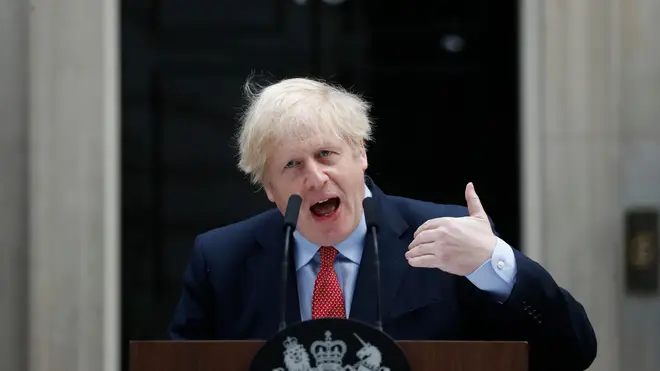
Shelagh Fogarty 1pm - 4pm
27 April 2020, 18:13

Boris Johnson returning to his desk in Downing Street on Monday provided a much-needed boost to his beleaguered government.
While his stand-in, Dominic Raab, won plaudits for steadying the ship in Mr Johnson’s absence, the role of prime minister carries an authority and ability to wrench the levers of power that is irreplaceable, especially in the midst of a national crisis.
Decisions like when and how to ease the lockdown are of a scale that only a prime minister can make.
Ministers hope that the morale boost his return gave his top team will be replicated outside Whitehall, giving a fearful and uncertain nation confidence that, as Johnson won his own struggle with coronavirus, so, collectively, we will win ours.
It was that optimism that the prime minister tried to convey in his statement from the steps of No 10 on Monday morning.
But for all his upbeat rally cries, his core message was one of caution: he urged people to continue to follow the current social distancing rules and pleaded for patience when it comes to easing the lockdown.

Prime Minister Boris Johnson addresses the nation after returning to work
Anyone who had hoped that Mr Johnson’s return would mark the beginning of the end for social distancing would have been sorely disappointed.
The hard truth is that with both the number of new cases and the number of daily fatalities still worryingly high, ministers currently have very little scope for relaxing restrictions.
Even if the government is unable to lift measures now or say when this will happen, it is nonetheless under mounting pressure to start to spell out its plan for lifting lockdown – whenever they may be.
Final decisions have not been made, and ministers are still waiting on data and further scientific advice this week before making them.
But with other countries (and the Scottish and Welsh governments) already having published draft plans, more and more Tory MPs voicing concerns and early indicators that the public may be starting to tire of lockdown, the UK government knows it will soon need to start laying out its own thinking.
Listen & subscribe: Global Player | Apple Podcasts | Google Podcasts | Spotify
Mr Johnson gave one hint of what this might be when he talked about “firing up the engines” of the UK economy one-by-one – reflecting likelihood of the lockdown being lifted by one economic sector at time.
He also promised that his government would start to speak more openly “in the coming days” about how it plans to gradually relax lockdown. I understand that is likely to be before the end of this week.
As part of a new commitment to what Mr Johnson called “maximum transparency”, ministers are also planning to release some of the scientific data upon which these huge decisions are being made, along with the names of some members of the highly influential Scientific Advisory Group for Emergencies (SAGE) committee.
Mr Johnson may be back at the helm, but in reality he has been having an increasing input in recent days on the course his government is taking. He spoke frequently to Mr Raab and other senior ministers and officials throughout last week.
Still, government insiders believe Mr Johnson’s return will lead to a new level of focus, energy and grip on this crisis. There is no denying that there is much to get a grip on.
As well as firming up the plan for easing lockdown, Mr Johnson will need to oversee the astonishing amount of work needed to get to that point, with further expanding testing, building an effective track and trace system and finding a long-term solution to PPE shortages among a number of key priorities.
All that will need be done quickly if any of the lockdown measures are to be modified following the next review, on 7 May.
Mr Johnson’s return may well bring a welcome boost, but pressure will soon mount for him to explain to people how his government will, in the coming months, protect not just the health of them and their families, but also that of the employers, the other companies and the wider economy that they rely on.